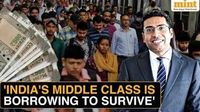A Growing Number Of Young Professionals In India Are Chasing The Dream Of Early Retirement, But Just When They Think They'Ve Cracked The Code, Reality Hits—Hard. Financial Analyst Hardik Joshi Spells It Out: "In The Us, People Retire At 35-40 With $1M (~₹8Cr). But In India? Even ₹10Cr+ May Not Be Enough." Why Does Early Retirement, So Achievable Elsewhere, Seem Almost Impossible In India? Joshi Points To The Growing Influence Of The FIRE Movement—Financial Independence, Retire Early—which Is Taking Off Globally. But In India, The Math Just Doesn'T Seem To Add Up.
Joshi Highlights That "Inflation Is Brutal," And Unlike The West, India Lacks A Robust Fallback System. "The Us Has 401(k), Social Security, Medicare," Joshi Explains. Here, Pensions Are Rare, And Savings Schemes Like EPF And NPS Often Fall Short For A Long Retirement. Adding To The Strain Is A Deeply Rooted Cultural Dynamic. "In The West, Retirement Means Saving For Yourself. In India, It Often Means Supporting Parents, Children, And Sometimes Extended Family Too." Even Those Who'Ve Saved Enough Can Be Blindsided. "A Medical Emergency Can Drain Lakhs In Weeks," He Notes, Highlighting How Underinsurance Leaves Many Vulnerable.
So How Much Is Enough? To Get There, He Suggests Investing Aggressively In Stocks, Mutual Funds, And REITs To Aim For 12–15% CAGR. Multiple Income Streams—Like Rentals, Dividends, And Digital Businesses—Are Key. Keeping Expenses Low Matters Just As Much, As Lifestyle Inflation Can Quietly Erode Savings. And At Least ₹1 Crore In Health Insurance Is Essential, Given How Unpredictable Medical Costs Can Be. "At Some Point, People Stop Asking ‘When Can I Retire?’ And Start Wondering ‘Can I Ever Retire?’" Joshi Concludes.
Meanwhile, Saurabh Mukherjea Of Marcellus Investment Managers Has Flagged A Troubling Reality In His Latest Podcast—The Fact That The Indian Middle Class Seems To Be Sinking Into A Massive Debt Trap, And The Numbers Are Only Getting Worse. He Points Out That Millions Of Middle-Class Indians Have Taken On Multiple Loans That They May Not Be Able To Repay Ever, And The Signs Are Everywhere.
Mukherjea Underlines Three Reasons Why India's Middle Class Is Losing Economic Momentum. First, The Burden Of Debt Is Becoming Unmanageable For Many Families, With High Interest Rates Adding To The Stress. Second, The Rising Cost Of Living, Particularly In Urban Areas, Is Outpacing Wage Growth, Leaving Many Families Struggling To Make Ends Meet. Lastly, The Lack Of Financial Literacy Is Preventing Many From Making Informed Decisions About Their Finances, Resulting In Poor Choices That Worsen Their Situation.
As The Situation Grows More Dire, Experts Like Joshi And Mukherjea Are Urging Individuals To Reassess Their Financial Strategies. The FIRE Movement Offers A Vision Of Financial Independence That Many Aspire To, But Without A Solid Plan, The Dream Can Quickly Turn Into A Nightmare. The Importance Of Building A Diverse Investment Portfolio And Maintaining A Safety Net Through Adequate Insurance Coverage Cannot Be Overstated.
In A Country Where Family Obligations Often Complicate Financial Planning, The Challenge Of Achieving Early Retirement Becomes Even More Daunting. Joshi's Recommendations To Invest Wisely And Diversify Income Sources Are More Relevant Than Ever As Young Professionals Navigate An Uncertain Economic Landscape.
Ultimately, The Path To Financial Independence In India Requires A Combination Of Strategic Planning, Aggressive Investment, And A Willingness To Adapt To Changing Economic Conditions. With The Right Approach, It May Still Be Possible For Some To Achieve Their Dream Of Retiring Early, But It Will Take Hard Work, Discipline, And A Clear Understanding Of The Financial Challenges That Lie Ahead.





